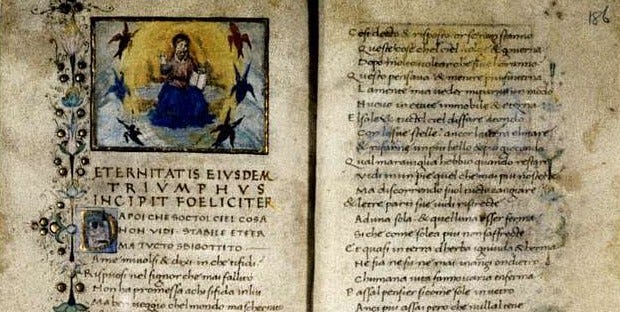YEAR
Manage episode 458236795 series 3540370
Our Christmas offers are still available at Word & Song!
Click on the button below to learn more.
The other day I came upon a photo of my grandfather and grandmother, sitting at a table, dressed for a big occasion, with their six children roundabout them, the women in nice dresses, and the men in coats and ties. That was my mother, her two sisters, and her three brothers. It was in the fall of 1974, and the old folks were celebrating their fiftieth anniversary. That would take us back to 1924, and a few years before then, because when my grandfather arrived in the United States from Italy, he went to the same coal-mining town in Pennsylvania that his neighbors back in Tiriolo went to, and that’s where he met my grandmother. Almost all the Italians in town came from Tiriolo, as I was to learn only later, when I was 24 and went to the old country myself and met my great aunts Concetta and Filomena and my great uncle Raffaelle, and a whole lot of cousins. Anyway, it’s the fiftieth anniversary now of that fiftieth anniversary, and only my mother and one of her sisters is still with us. I’d have been at that celebration with my older cousins, except that I was far away in Philadelphia, in the hospital with a mysterious and fierce and chronic ailment in my left leg, the one that has few valves and not any great lymph system. Nobody knew what was wrong with it. Later I came to wonder whether I’d ever make it to the year 2000. I did, obviously, and I’m still here, though now I’m returning to taking things one at a time — that is, one year at a time, our Word of the Week.
My grandfather died at age 91, though he always counted things differently: he’d have said, rightly, that he was in his 92nd year. My grandmother died eight years later, at age 96. They are with me still. I see him hoeing the furrows in his big terraced garden in back of his house and my uncle’s house, next to each other. He should have been a farmer, not a coal miner. “I could put a seed in the ground and spit on it,” he told me once, “and it would grow.” He could, too. For some years he managed to keep alive, outdoors, in northern Pennsylvania, a fig tree somebody brought him from Italy, wrapping it up in blankets when the cold and the snow came. It bore fruit. As for my grandmother, she dandled nineteen grandchildren in her lap, and a few great-grandchildren also before she got too frail to do it, and a purer and kindlier and more patient Christian soul I never knew. And I think of them more and more as the years weigh on my own back.
The ancient Babylonians did what a lot of human cultures have done, making a great deal of looking at the sky and trying to determine what was going to happen in the future by reading the stars. That’s part of the reason why they invented so much in mathematics. The other part of the reason was that if you’re going to have a complex system of irrigation and drainage along the nearly flat Tigris and Euphrates river valleys, you’d better be good at calculating angles and measuring distances. The Persians were star gazers too, though I don’t know if they picked that up after they conquered the Babylonians. In any case, they too looked to the heavens for signs, and since the Jews had been dragged off to Babylon in captivity after Nebuchadnezzar’s armies sacked and destroyed Jerusalem, they would have learned about the prophecy of an anointed King to come, and it was natural for them to look for his sign in the heavens: “A star shall advance from Jacob,” said Balaam, that raffish prophet for hire.
The Jews did not consider the stars to be divine. “And he also made the stars,” says the sacred author of Genesis, as if it were something that God also did, by the way. But the stars and the sun and the moon were, of course, to be “for signs, / For seasons, and for days, and circling years,” as Milton put it. They too were to be for man’s benefit. And we do measure our years by those signs, whether it’s a solar year you’re talking about or the very slightly longer sidereal year, the year measured by the earth’s position relative to the stars. But when I look up at the night sky, where I happen to be fades a little from my attention, and it’s as if I were looking up at that same sky fifty years ago, or sixty years ago, when I was a very little boy and I said to my mother, pointing at a sideways W, “That’s Cassiopeia!” — calling it “Cassi-O-peia,” if I remember. Eternity seems then not at all like a never-ending succession of days and nights — and that’s not what it is, anyhow. It seems then like having all times present, and all you have to do is to turn your eyes, not to remember, in a hazy way, but to see, bright and clear, because what you see will not be a memory only, but the reality, also present, and never to fade away.
Christmas Gift Subscription Offer
Did you think I’d let you get off free without even a little glance at where our word comes from? Not at all! It comes from an Indo-European root, yer-, that sometimes means “year” and sometimes “spring,” as in Slavic jaro, and sometimes some period of time, as when Greek hora entered Latin and came to denote a much shorter time than a whole year: an hour! So the words hour and year are pretty much the same word entering English along separate tracks, the first from Latin through Old French, and the second straight from the ancient Germanic stock. Now, we would pronounce it as gear, except that g before a front vowel (the vowels in hat, met, mate, fit, and treat) was “palatalized,” meaning that the back of the tongue was raised toward the palate, and so the g turned into y. But before the other vowels, it didn’t do that. So that’s why we have quite a few doublets with g and y, depending on the nearby vowel in the dialect where the word was pronounced. My favorite is garden / yard, and though the snow is on the ground and I’m in New Hampshire and not Pennsylvania, that’s where I see my grandfather, right now, at this hour, this year.
Word & Song by Anthony Esolen is an online magazine devoted to reclaiming the good, the beautiful, and the true. We publish six essays each week, on words, classic hymns, poems, films, and popular songs, as well a weekly podcast for paid subscribers, alternately Poetry Aloud or Anthony Esolen Speaks. Paid subscribers also receive audio-enhanced posts and on-demand access to our full archive, and may add their comments to our posts and discussions. To support this project, please join us as a free or paid subscriber. We value all of our subscribers, and we thank you for reading Word and Song!
Paid subscribers: enjoy a special 50% off rate on gift subscriptions through January 7th by using the button below. You may schedule the date when you wish your gift subscription(s) to begin.
Thank you again for supporting Word & Song.
Christmas Gift Subscription 2024
9 episoade






